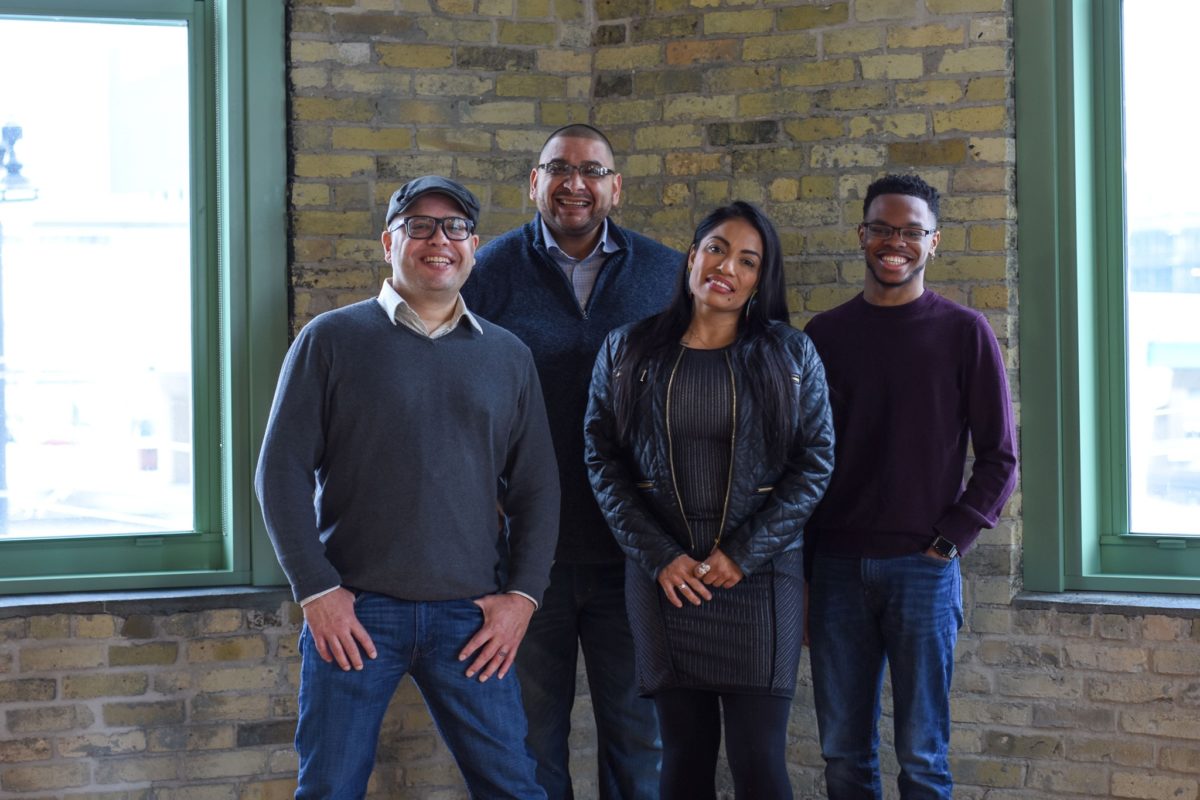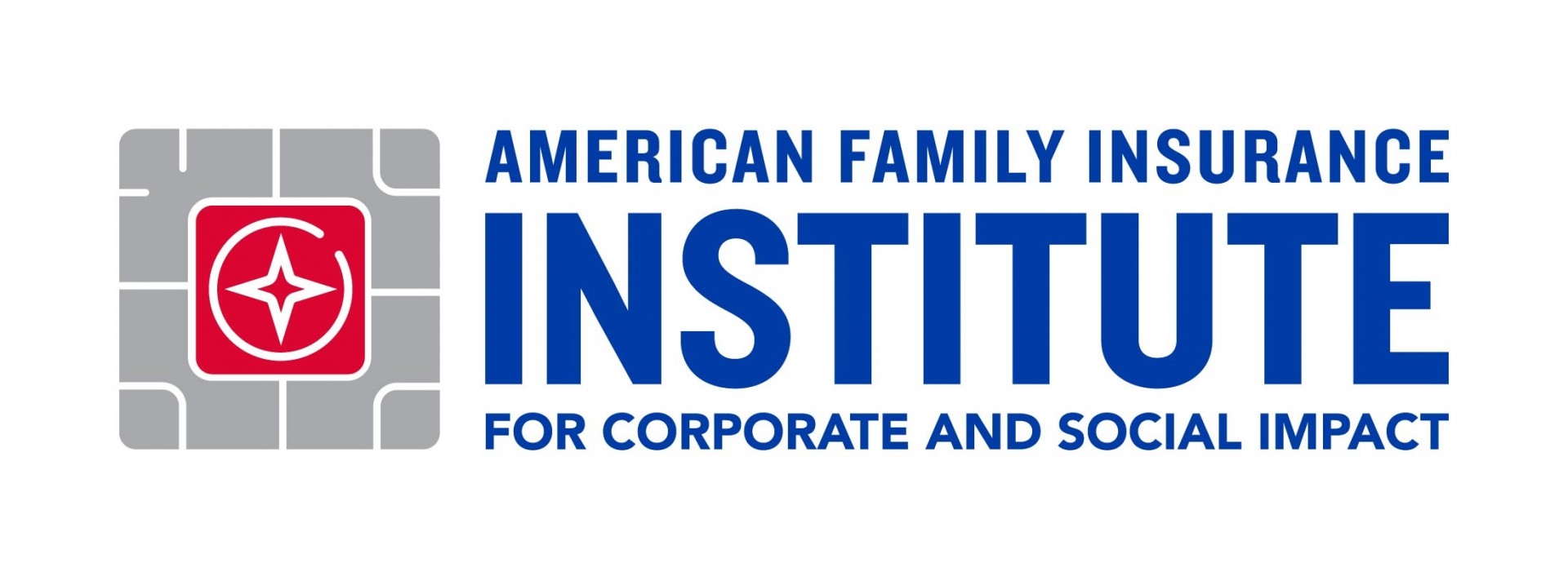At a cocktail hour during Milwaukee Tech Week, Ruben Gaona flits through the crowd.
In the small but lively downtown gathering of the city’s BIPOC tech community, the startup cofounder looks right at home, joining the circles of conversation and exchanging banter among his fellow entrepreneurs. But below the surface, Gaona can’t help but think of how he’s managed to beat the odds.
Just five years ago, Gaona was on the verge of being released from prison after serving seven years out of a 10-year sentence. Today, he is one-half of the duo behind The Way Out, an anti-bias employment platform that aims to “break the cycle of incarceration” by connecting justice-involved jobseekers with employers.
“When I first started thinking about my business, people were like, ‘This isn’t going to work’ and telling me ‘no, no, no,’” Gaona tells Technical.ly. “They told me I should find something stable. And yet, here we are.”
Here is at the intersection of social impact and tech. Here is at speaking engagements statewide. Here is urging employers, politicians and other city leaders to look beyond criminal pasts to give people a second chance. Here is a mission that is absolutely personal.
Eli Rivera is Gaona’s cofounder and also a formerly justice-involved individual. The pair met serendipitously when both were guests at a social impact event addressing recidivism in 2019. They were pitching business ideas to separate groups when they were briefly introduced by another panelist. The two immediately hit it off.
“Our stories are so similar … coming from nothing, that put us in the system, and [finding a path] that allowed us to rewrite our last chapters,” Rivera said. “Having been in a halfway house, I’ve seen when people couldn’t find or maintain a job. And seeing that these conditions create these ongoing challenges, I wanted to be a part of the solution.”

The Way Out cofounders Ruben Gaona and Eli Rivera. (Courtesy photo)
Gaona shared Rivera’s passion. While brainstorming ideas to address the hardships formerly incarcerated individuals face upon reentering society, they eventually landed on building an app to help formerly incarcerated individuals find viable employment and align their services with full wraparound support, something the pair considered a critical missing piece in the journey to reentry.
While many returning citizens are connected to state or local reentry programs, these programs rarely provide a centralized solution for transitioning back into their communities, leaving many justice-involved individuals to fend for themselves, Rivera said.
“The intention is always good with these organizations,” he said. “They have decades of experience in the space, but the challenge is you have all of these different entities and they are all offering bits and pieces of services. There is a disconnect if or when someone has received services or whether someone has fallen through the cracks. [Our goal] was to show them what is successful out here, as well as the programs providing the most successful services, and really streamline the journey.”
It shows a role that software can play a role in connecting returning citizens with job opportunities. The work to ease re-entry has galvanized policymakers and entrepreneurs alike across the country in recent years. After a wave of local and state-level action to “ban the box,” President Barack Obama in 2015 notably proposed a regulation that eliminated criminal background from the pre-employment offer hiring process. In cities like Baltimore and DC, Mission:Launch organized entrepreneurs and community members to hack solutions for re-entry around the middle of the last decade. The platform offered by The Way Out brings together returning citizens, employers and services in one place.
A second chance
Every week, more than 10,000 people are released from US prisons. More than two-thirds of those who exit the system are likely to be arrested within the next three years, according to the United States Department of Justice. Both Rivera and Gaona say a persistent lack of supportive resources and the lingering stigma of incarceration — a major barrier to employment — are to blame.
The trickle-down effect of checking “the box” is daunting. With more than 94% of employers conducting background checks and up to 75% of formerly incarcerated individuals remaining unemployed one year after their release, getting out of jail and getting on the right path can often feel like a Sisyphean task.
Speaking from the mindset of a returning citizen, Gaona said, “The last thing I want to do is tell an employer about my issues. I would rather stay quiet. I might have housing issues, childcare issues. I might start calling in. Then I’m getting terminated.”
No one wants to be remembered for the worst thing they’ve done.
Combined with the pressures of repairing fractured family relationships, finding affordable housing, reliable transportation and mounting financial stressors related to bills, child support or parole fees, the founders say it isn’t difficult to understand why so many people end up back behind bars.
The counterproductive system of reentry threatens to diminish people’s self-worth, Gaona says. He recalls one instance following his release when an employer uncovered his felony record. Despite having served in the military and qualifying for the case manager role, he was promptly informed the job had been waitlisted and encouraged to apply for a janitor’s position instead. Gaona remembers sitting in his car afterward and crying out of frustration.
“You’re so accustomed to making so little when you’re incarcerated, so when you get out you just settle for any job,” added Gaona. “No one wants to be remembered for the worst thing they’ve done. It’s hard to find a good support system to encourage you to keep going and knowing what [you’re] worth. But just because I’m a felon doesn’t mean I don’t bring anything to the table.”
Rivera nods in agreement.
“Here is a population of people who just need a second chance,” he said. “It’s about accepting them with open arms and elevating someone’s self-esteem and worth by recognizing the humanity of the person and the value they can bring with their creativity, financial impact and benefit to the economy.”fno
An untapped workforce
In Milwaukee, the city’s high rates of incarceration — especially for Black and brown citizens — remain a stain on the community fabric. Research from The Sentencing Project found that one out of every 36 Black adults in Wisconsin is currently serving time in prison. Black adults make up roughly 42% of prisoners, though they make up just 6% of the state’s population. And Milwaukee is home to the most incarcerated ZIP code in the nation: 53206.
These statistics are staggering, yet Rivera and Gaona see a golden opportunity to uncover a hidden workforce.
The Way Out creates blind, contextual profiles for its justice-involved job seekers. Their profiles list strengths such as personality traits, personal accomplishments, certifications, and employment histories — but remove any mentions of their name, address, or criminal background once it’s sent over to an employer to eliminate immediate biases.
The goal is to get employers to “see the true value of the human being,” and provide a direct-hire model, rather than temp services, Rivera said.
The goal is to provide a direct-hire model.
“A lot of the clients we get are disenfranchised by the traditional staffing agency,” added Rivera of justice-involved job seekers. “We’ve never wanted to be a part of that. We get them in the door, we make a match, we offer support, but they immediately become the employers’ employees.”
“We take away what might be leaving that person behind,” Gaona added.
While studies show ex-felons tend to have lower turnover than conventional hires due to the scarcity of opportunities, it hasn’t always been easy to convince employers to join The Way Out’s hiring platform. Once the pandemic struck and companies began to grapple with labor shortages, more employers were willing to give second-chance employment a shot.
2021 has been a milestone year for The Way Out. The startup recently launched the 2.0 version of its platform and is generating revenue from its hiring matches — helping the young venture validate its business model and attract funding and support. More importantly, the company has assisted 53 individuals with support services and has helped to place more than 25 justice-involved job seekers into life-sustaining roles with reentry support.
For the founders, the progress of the platform is a testament to the importance of second-chance programs.
“At the end of the day, we are here for people coming out of incarceration,” Rivera said. “We have an entire lifetime to create a new chapter. When the pen is hitting the paper, beautiful things can happen. Don’t close the book. Allow it to be written.”
Subscribe to This Week in Milwaukee RisingBefore you go...
Please consider supporting Technical.ly to keep our independent journalism strong. Unlike most business-focused media outlets, we don’t have a paywall. Instead, we count on your personal and organizational support.
3 ways to support our work:- Contribute to the Journalism Fund. Charitable giving ensures our information remains free and accessible for residents to discover workforce programs and entrepreneurship pathways. This includes philanthropic grants and individual tax-deductible donations from readers like you.
- Use our Preferred Partners. Our directory of vetted providers offers high-quality recommendations for services our readers need, and each referral supports our journalism.
- Use our services. If you need entrepreneurs and tech leaders to buy your services, are seeking technologists to hire or want more professionals to know about your ecosystem, Technical.ly has the biggest and most engaged audience in the mid-Atlantic. We help companies tell their stories and answer big questions to meet and serve our community.
Join our growing Slack community
Join 5,000 tech professionals and entrepreneurs in our community Slack today!

The person charged in the UnitedHealthcare CEO shooting had a ton of tech connections

From rejection to innovation: How I built a tool to beat AI hiring algorithms at their own game

Where are the country’s most vibrant tech and startup communities?




